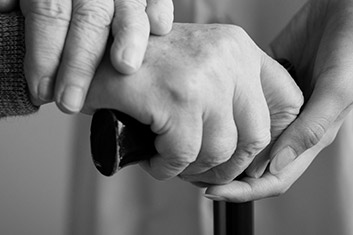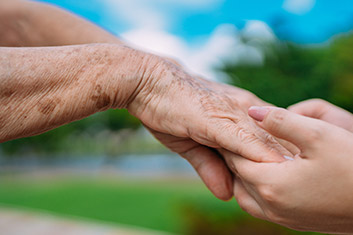News & Updates
Edadismo 103: Sesgos en la atención
Published March 2023 | Read this Article in English Los sesgos basados en la edad, o discriminación por edad, en [...]
News & Updates
Edadismo 103: Sesgos en la atención
Published March 2023 | Read this Article in English Los sesgos basados en la edad, o discriminación por edad, en [...]
Blog Topics
5 Modos en que Promotores de Salud Involucran a los Adultos Mayores Hispanos/Latinos.
La población de adultos mayores esta creciendo en los Estados Unidos y los adultos mayores hispanos/latinos es el grupo que está creciendo más rápido que todos. Se espera que hispanos mayores de 65 años aumente desde 4.6 millones en 2017 a 19.9 millones en el año 2060.1 Es importante involucrar hispanos en los servicios de salud mientras envejecen para promover buena salud y bienestar; reducir disparidades de salud; y prevenir la aislación social, heridas por caídas; y el desarrollo de enfermedades crónicas.
5 Ways Community Health Workers Engage with Hispanic/Latino Older Adults
The older adult population is growing in the United States and older Hispanic/Latino adults are the fastest growing group. Hispanics over 65 years old are expected to grow from 4.6 million in 2017 to 19.9 million in 2060 . It is important to engage Hispanics in health services as they age to promote health and wellbeing; reduce health disparities; and prevent social isolation, injury due to falls, and the development of chronic conditions.
Involving Children and Parents in Diabetes Health Education for Youth
Health education is one of the core components of decreasing the prevalence of diabetes and improving health outcomes around the disease, especially when it comes to children. The earlier in a child’s life that they can learn healthy habits, the better their health outcomes will be later in life. Doing this establishes a foundation that will make it easier to maintain healthy behaviors and avoid the controllable factors that contribute to diabetes onset as adults.
5 Modos en que Promotores de Salud Involucran a los Adultos Mayores Hispanos/Latinos.
La población de adultos mayores esta creciendo en los Estados Unidos y los adultos mayores hispanos/latinos es el grupo que está creciendo más rápido que todos. Se espera que hispanos mayores de 65 años aumente desde 4.6 millones en 2017 a 19.9 millones en el año 2060.1 Es importante involucrar hispanos en los servicios de salud mientras envejecen para promover buena salud y bienestar; reducir disparidades de salud; y prevenir la aislación social, heridas por caídas; y el desarrollo de enfermedades crónicas.
5 Ways Community Health Workers Engage with Hispanic/Latino Older Adults
The older adult population is growing in the United States and older Hispanic/Latino adults are the fastest growing group. Hispanics over 65 years old are expected to grow from 4.6 million in 2017 to 19.9 million in 2060 . It is important to engage Hispanics in health services as they age to promote health and wellbeing; reduce health disparities; and prevent social isolation, injury due to falls, and the development of chronic conditions.
Involving Children and Parents in Diabetes Health Education for Youth
Health education is one of the core components of decreasing the prevalence of diabetes and improving health outcomes around the disease, especially when it comes to children. The earlier in a child’s life that they can learn healthy habits, the better their health outcomes will be later in life. Doing this establishes a foundation that will make it easier to maintain healthy behaviors and avoid the controllable factors that contribute to diabetes onset as adults.








